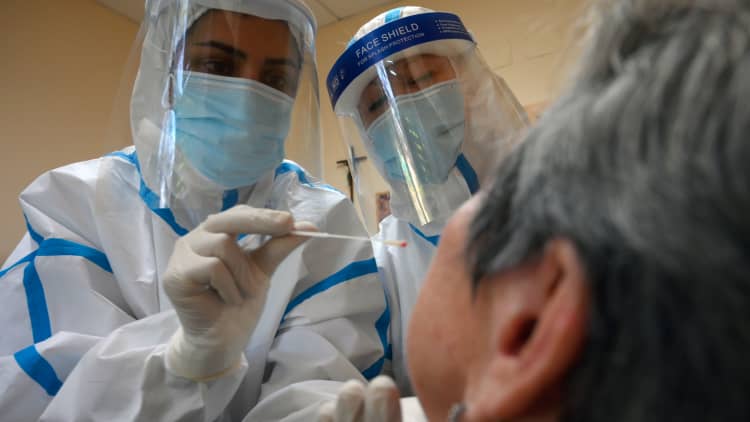Some countries are on "a dangerous track" in the coronavirus pandemic and hospitals are beginning to reach capacity ahead of winter, the head of the World Health Organization said Friday.
"Too many countries are seeing an exponential increase in cases and that's now leading to hospitals and ICU running close or above capacity and we're still only in October," Director-General Tedros Adhanom Ghebreyesus said during a press briefing.
He called on world leaders where cases are surging to "course correct as quickly as possible."
"We are at a critical juncture in this pandemic, particularly in the Northern Hemisphere," he added.
"The next few months are going to be very tough and some countries are on a dangerous track."
Covid-19 has spread to more than 41.8 million people across the globe since it emerged in late December, killing more than 1.1 million, according to data compiled by Johns Hopkins University, shuttering businesses and devastating economies from the U.S. to Asia.
WHO officials warned last week that coronavirus outbreaks in Europe have become "concerning." The region continues to report a "rapid increase in cases and deaths," with new cases growing 25% over the week, according to a WHO situation report published Tuesday.
France, the United Kingdom, Russia, the Czech Republic and Italy contributed to over half of all reported cases during that period, the report says.
In the U.S., outbreaks taking hold in the Midwest have led to a significant spike in new cases. The nation reported more than 71,600 new coronavirus cases on Thursday, approaching a record number of daily infections set in late July.
Even for countries that have successfully suppressed their outbreaks, Tedros said "now is the time to double down" and to take quick action for arising clusters.
"We urge leaders to take immediate action to prevent further unnecessary deaths, essential health services from collapsing and schools shutting again," Tedros said at the organization's Geneva headquarters. "This is not a drill."
Dr. Mike Ryan, executive director of the WHO's health emergencies program, said a second wave of infections is "not only possible but highly likely anywhere in the world." Ryan said some countries that have been able to suppress their outbreaks didn't "follow through" on testing, contact tracing and isolation, along with other measures to reduce the virus' transmission, and allowed the disease to "creep back in."
"No country is out of the woods," he said.
While new cases have accelerated, coronavirus fatalities have remained relatively stable, according to the WHO. However, fatalities typically lag infections by a few weeks. Deaths have started to creep up in Europe, the Eastern Mediterranean region and Africa over the last seven days.
"We need to prevent transmission, but we also need to focus on reducing the death toll, which will rise in the coming days — I have no doubt," Ryan said.



